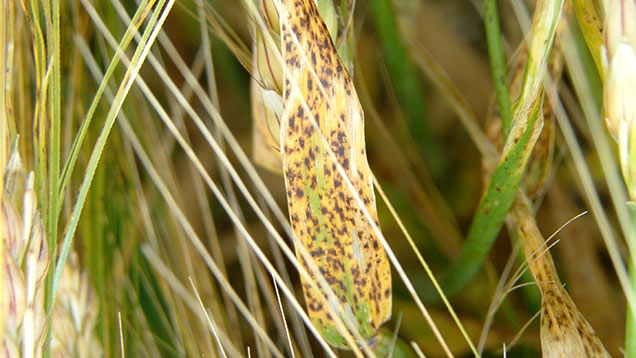Ramularia early warning scheme to reach all UK barley growers in 2016

An early warning forecast for the barley disease ramularia is set to be launched across the whole of the UK next year after four years of running the scheme in Scotland.
This late season disease of barley can cut yields sharply in bad years and has become more prevalent in recent years and is now Scotland’s second worst yield-hitting barley disease after rhynchosporium.
Scottish researchers have devised the ramularia early warning scheme as when the disease’s distinctive rectangular blotches are seen on the leaves it is too late to use fungicides.
“The time you see the disease it is almost always post flowering and so too late to spray,” Neil Havis, researcher at Scotland’s Rural College (SRUC) said.
See also: Barley study to rank varieties for grain skinning resistance
His team has developed a risk forecast based on the wettness of barley stems for two weeks around the start of stem extension, or GS31, coming from rainfall and dew.
The work is part of SRUC’s control of ramularia in a changing climate project, known as Coracle, which gives Scottish growers a risk assessment so they are able to adjust their T2 fungicide sprays.
“If there is a high risk, this allows growers to beef up their T2 sprays,” he adds.
He points out that SDHI fungicides are very good at ramularia control, the azole prothioconazole good/very good and chlorothalonil also good/very good.
This has led to a big increase in the use of the cheapest option of chlorothalonil on barley in Scotland in recent years.
Ramularia was first recognised in the UK in 1998 and its spread has been encouraged by the longer growing seasons over the last two decades as growers drill earlier and harvest later.
It has been also prompted by the greening effects of treatments on crops such as from some fungicides, and also a gene introduced into varieties for mildew resistance which has been shown to make barley varieties more susceptible to ramularia.
The HGCA Recommended List of spring barley gives resistance scores from a lowly 4 to a high 8 in a scale between 1-9, with Scotland’s most popular variety Concerto scoring a 6.

